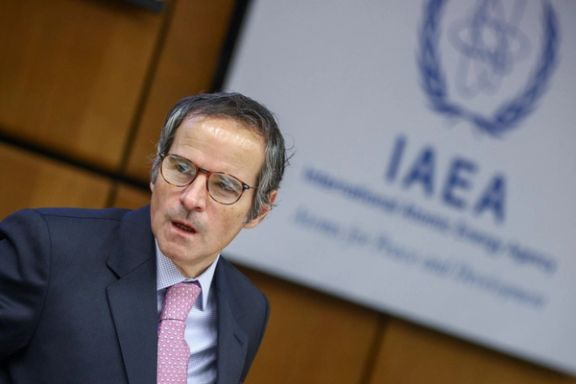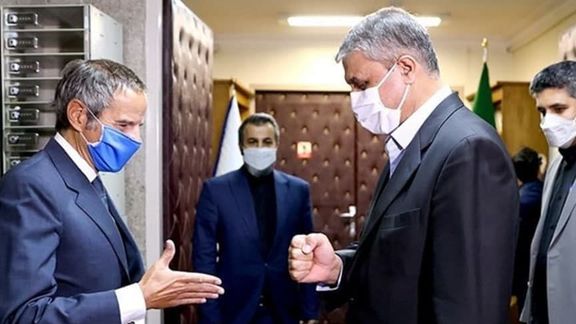IAEA's Grossi Warns Iran Nuclear Program May Be Copied

Iran’s developing nuclear program could lead other countries to follow suit, according to Rafael Mariano Grossi, head of the International Atomic Energy Agency.

Iran’s developing nuclear program could lead other countries to follow suit, according to Rafael Mariano Grossi, head of the International Atomic Energy Agency.
In a lecture delivered in Australia Tuesday, Grossi said that “challenging” diplomacy aimed at restoring the 2015 Iran nuclear was taking place in an “important” context.
“The lack of progress in verifying the peaceful nature of Iran’s nuclear program may affect other countries’ decisions,” Grossi said at the Coral Bell School of Asia Pacific Affairs, Canberra. “We are now in a situation where Iran’s neighbors could start to fear the worst and plan accordingly. There are countries in the region today looking very carefully at what is happening with Iran, and tensions in the region are rising. Political leaders have on occasionally openly stated they would actively seek nuclear weapons if Iran were to pose a nuclear threat.”
Grossi did not elaborate. There have been intermittent, but unsubstantiated reports, that Saudi Arabia has an arrangement with Pakistan over an option of importing technology needed for nuclear weapons. Saudi Arabia plans to operate two nuclear reactors for civil purposes by 2040. Like Tehran, Riyadh is a signatory of the Nuclear Non-Proliferation treaty (NPT).
Grossi said “a defining moment” was being reached for “global nuclear non-proliferation,” with continuing “tendencies towards proliferation” despite a “strong” international non-proliferation framework with 192 NPT signatories and 175 member states in the International Atomic Energy Agency (IAEA).
The IAEA director-general emphasized the importance of additional protocols, agreements reached with non-nuclear states giving greater inspections powers to the agency than required under the more limited NPT ‘safeguards’ arrangements. He argued that additional protocols developed by the 1990s reflected experience of Iraq, where a declared nuclear program in the 1980s hid an undeclared program that was “far from peaceful.”

Grossi also cited a lack of agency access in the nuclear programs of apartheid South Africa, North Korea, Libya, and Syria.
Iran – ‘periods of tension and cooperation’
Turning to Iran, Grossi surveyed 20 years of “countless interactions between the IAEA and Iran aimed at verifying that Iran’s nuclear program is purely peaceful.” He referred to “UN Security Council resolutions demanding that Iran cease all enrichment… times when Iran provisionally applied an additional protocol and times when it did not…[as well as] periods of cooperation and periods of tension.”
Grossi recalled the days of the 2015 nuclear agreement, the JCPOA (Joint Comprehensive Plan of Action), which ended with United States withdrawal in 2018 and Iran in 2019 beginning to exceed JCPOA limits on its nuclear program.
“The IAEA was charged [under the JCPOA] with verifying that Iran respected the new restrictions on its nuclear program,” Grossi said. “Of great importance also was Iran’s acceptance once more of the additional protocol.”
‘Credible Information’
Iran ceased to apply the additional protocol in early 2021, leading to restrictions on IAEA inspectors’ access. A series of ad hoc arrangements reached by Grossi with Tehran did not prevent the IAEA chief from declaring in June that with the prevailing level of access he would within four weeks being unable to certify the peaceful nature of the Iran nuclear program.
In his speech Tuesday, Grossi also highlighted agency dissatisfaction at Iran’s explanation of uranium traces found at sites linked to work before 2003 in the face of “assembled credible information indicating a possible military dimension.” The IAEA board last month passed a resolution censuring Iran over its alleged failure to resolve these “longstanding safeguards issues.”
Grossi defended a return to the JCPOA in the face of last week’s failure by the US and Iran, meeting in Doha ‘proximity’ talks, to agree a path back to compliance. The IAEA chief said that after decades of work to combat proliferation “what remains constant is that the Agency is the ultimate guarantee of any agreement.” Without IAEA participation, he argued, “any agreement is unverifiable.”